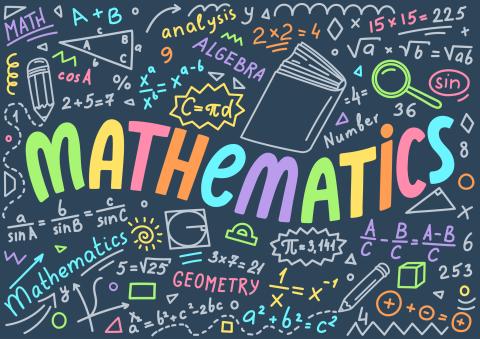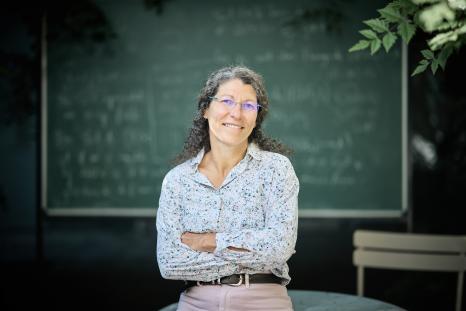
Mélanie Guenais: a committed mathematician engaged in research, transmission and public action
Mélanie Guenais is a lecturer in the Topology and Dynamics team at the Orsay Mathematics Laboratory (LMO - Univ. Paris-Saclay/CNRS), Vice-President of the French Mathematical Society and founder of the Maths & Sciences collective. She has devoted her career to dynamic systems, the education and dissemination of mathematics and the defence of its place in society.
Originally from Essonne, Mélanie Guenais joined a scientific 2-year preparatory course for a competitive exam at the Lycée Henri-IV in Paris in 1987. With no access to boarding facilities for women at the time, she continued her education while living in the suburbs. She then entered the École Normale Supérieure in Paris, where she was one of only two female mathematics students in her class. In 1993, she obtained the "agrégation" in mathematics.
Specialisation in ergodic theory
Mélanie Guenais studied for a PhD in ergodic theory, a branch of mathematics at the intersection of analysis, probability and dynamics and concerned with the transformations of a system over time. Her thesis, defended in 1997 at Université Paris 13 (now Université Sorbonne Paris Nord), focused on the spectral properties of dynamic systems. In it, she explored how regular mathematical objects, such as rotations, can give rise to complex behaviours when slightly disturbed by small deformations.
A solid and unique scientific journey
Recruited as a lecturer at Université Paris-Sud (now Université Paris-Saclay) in 1998, she continued her research into ergodic theory at the LMO. She also wrote an ambitious theoretical work on atypical systems. Published online in 2006, this work, often cited in the scientific literature, offers an original answer to open questions from the 1980s by constructing examples of dynamic systems with very specific spectral properties. It highlights the possibility of extremely diverse behaviours based on fine deformations of simple systems.
Between 2007 and 2011, she took four years' parental leave and lived in the USA, although she remained connected to the scientific community thanks to several invitations to international conferences.
Return to Orsay and exploration of knowledge transmission methods
During her leave, Mélanie Guenais explored a different way of teaching mathematics, and in 2011 she returned to France and Université with fresh momentum. Her experience led her to design mathematics workshops for primary school classes, using geometric objects and concrete manipulations to encourage observation, reasoning and argumentation.
She was asked to develop her mathematics outreach activities and organised the MATh.en.JEANS (Mathematics in jeans) conference in Orsay in 2013, during which middle and high school students showcased their introductory mathematical research work. At the same time, Mélanie Guenais helped launch the Centre for Science Initiation and Awareness (MISS) and designed scientific workshops combining mathematics and botany. She also ran around 40 workshops a year in primary schools across the Paris region.
University and continuing education responsibilities
Between 2017 and 2022, Mélanie Guenais took on a number of teaching responsibilities. She oversaw the Master's track in Education (MEEF) first level at Université Paris-Saclay, working with inspectors and trainers in the field. She was also involved in the National Training Plan led by the Directorate-General for School Education (DGESCO). She helped to train district mathematics advisors as part of the Torossian-Villani Plan. From 2020, the lecturer led the new mathematics undergraduate degree at Université Paris-Saclay, against the backdrop of the health crisis. This education is now well established: "It is designed to support students in the construction of their projects and offers a coherent, solid pathway that leads to a range of career opportunities, including engineering colleges and the 'agrégation'."
Public speaking and national engagement
In 2020, the lecturer's career took a decisive turn when she joined the Board of the French Mathematical Society, as Vice-President in charge of teaching. She became involved in collective reflection on high school reform and the place of mathematics in society.
In January 2022, during the launch of the presidential campaign, she wrote a memo co-signed by the learned mathematical societies, warning of the dramatic decline in the number of girls studying sciences in high school. A historic break, interrupting 25 years of continuous progress. This statement received considerable media coverage.
Mélanie Guenais then founded the Maths&Sciences collective, which today brings together over 30 interdisciplinary associations: learned societies, associations of teachers of secondary schools and 2-year preparatory courses for a competitive exam, associations promoting the feminisation of science, and representatives of the business world. The collective is built around a shared desire to open up science education to a wider and more diverse public, particularly by reducing the elitism associated with mathematics. Together with this think tank, she produced analyses, articles and recommendations, and interacted with the media, public authorities and institutions.
Public data analysis and scientific engagement to benefit society
Alongside her public speaking appearances, the lecturer was involved in a rigorous analysis of educational data. She joined the Collège de France as associate researcher at the Institut du Monde Contemporain. She launched a multi-disciplinary research and action project involving science teaching and education professionals, sociologists, historians, economists and didacticians, to document the evolution of scientific training. This approach, at the frontier between research and society, is designed to be transparent and make analytical tools available for public debate.
Current projects and prospects
Currently working as part of a CNRS delegation to advance this research project, Mélanie Guenais plans to continue this momentum in 2025. She is developing new collaborations and continuing dialogue with the media, politicians and companies, while at the same time feeding into collective reflection within the Maths & Sciences collective. "The intersection of mathematics, education and society is where I find the true meaning of my work today. As scientists faced with societal challenges, becoming more accessible, welcoming without judgment so we can teach science at all levels, and changing how we consider excellence, seem to me to be critical issues we must address today."

